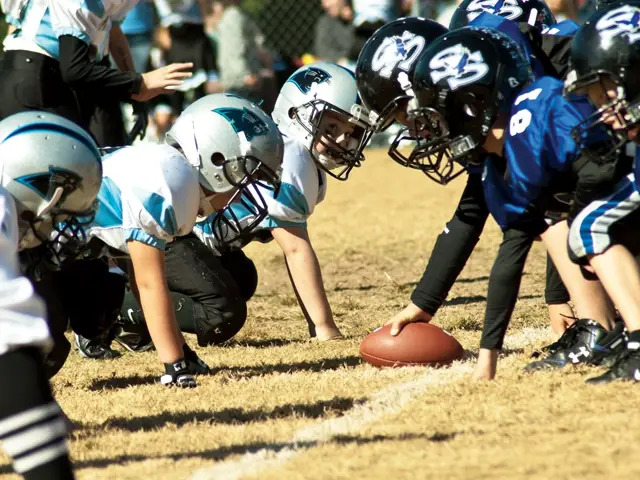With so much talk of concussions in the sport of football of late, many parents are shying away from the sport. If your child is set on hitting the gridiron, we’ve got ways to ease your anxiety.
Watching your pint-sized child pull on a football helmet that barely allows you to see his face and pads that puff his body to nearly double his size for the first time can be terrifying. Standing there, you think: There are so many things that could go wrong.
You may remember when Eric LeGrand was paralyzed while playing at Rutgers in 2010. Or perhaps it’s the first episode of NBC’s Friday Night Lights, during which All-American Jason Street is paralyzed, that haunts you. Or, maybe, you’ve heard rumors that all football organizations—from the NFL through Pop Warner leagues—are researching ways to decrease the number of concussions athletes sustain.
Relax. There are ways to keep your child safe. League officials and coaches are doing their best, too. If you’re still anxious, there are ways to monitor your reactions to improve your (and your child’s) football experience.

Rule Changes
This year, Pop Warner officials have added two rules to decrease the likelihood that athletes will sustain concussions. Coaches are required to reduce the amount of contact at each practice to one-third of practice time. The league is banning full-speed head-on blocking or tackling drills in which players line up more than three yards apart. Coaches must make sure there is no head-to-head contact at any time, too.
With the rules changes parents should breathe a little more easily, especially if they’ve taken the appropriate steps to make sure that their children are ready to play, says pediatrician Michael Bachman, the regional medical director at PM Pediatrics.
Readying for Play
Prior to beginning their football careers, parents should make sure that their children are physically fit and have learned the sport’s basics by playing flag football with friends. Asphalt Green and the New York City Parks and Recreation Department offer fall flag football leagues. Brooklyn Extreme Flag Football league is another option. Thanks to a partnership between the New York Jets and the New York Department of Education, several middle schools offer flag football, as well.
Once children have learned the basics, parents should research the different tackle football leagues and the divisions within those leagues. There are different age, height, and weight limits in each division to help parents determine where their children should play.
“It is important not to rush a child to play on a more advanced team where a smaller player would be at greater risk of sustaining injuries from larger players,” says Bachman, who notes that most leagues use age criteria as a guideline, not as a set-in-stone marker.
At a young age, Bachman says, children should focus on having fun and being a member of a team. And, because both physical and emotional maturity levels may vary from child to child, it’s important that parents discuss their child’s readiness for a certain level with coaches or league officials if there is any doubt that he’s able to keep up with his peers.
“Children shouldn’t be pushed into a sport or be placed in a competition that they are not physically or emotionally ready to handle,” Bachman says.
Safety Measures
Once children are placed on the appropriate teams, parents should also be aware of safety measures that the league has in place and make sure their child’s pads and helmet fit correctly.
Most helmet suppliers can fit children, but parents must check that air bladders within the helmet are properly inflated at all times. Jaw pads, chin straps, and neck bands must be properly positioned each time the helmet is used. Shoulder pads should cover the clavicle, shoulder joint, shoulder blade, and deltoid. The neck opening should be adequate and all straps should be laced securely.
Parental Anxiety
By finding the right leagues and equipment for children, parents should work on their own anxiety issues, suggests Leah Lagos, Psy.D., who practices in Midtown East.
Anxious parents, Lagos says, shouldn’t judge themselves too harshly. Instead, they should discuss their fears with their child, spouse, or with their child’s coach. Parents who did not play football themselves or didn’t have siblings who played are more likely to be nervous about the sport until they get a better understanding of it.
By discussing their concerns with others, parents will be able to identify how to cope with their concerns, also. If a parent feels that the head coach needs an assistant to watch all of the children, he or she could volunteer. Even those who don’t know the sport well can help keep little ones focused or assist by managing behavioral issues while the coach focuses on teaching skills.
Sometimes, parents may realize that their children’s behavior or temperament makes them anxious. They may fear that children who are often distracted may not pay attention to the coach or follow his instructions. In that case, parents may need to talk with their child about how important it is to listen and follow directions.
During games, it may be easier for anxious parents to avoid watching certain plays. Volunteering to work the concession stand or sell raffle tickets can be distracting, but still provide parents the opportunity to be involved. Many of the parents working at these booths have probably watched their children play football for years and can be reassuring.
And, Lagos said, parents should never underestimate their ability to control their emotions through simple tried-and-true methods. “Something that is very important that anxious parents and athletes forget to do is to breathe,” Lagos says. “Simple breathing exercises are a wonderful way to help reduce anxiety, and I recommend them to all of my clients.”
Learn how to tell when a head injury is serious.















